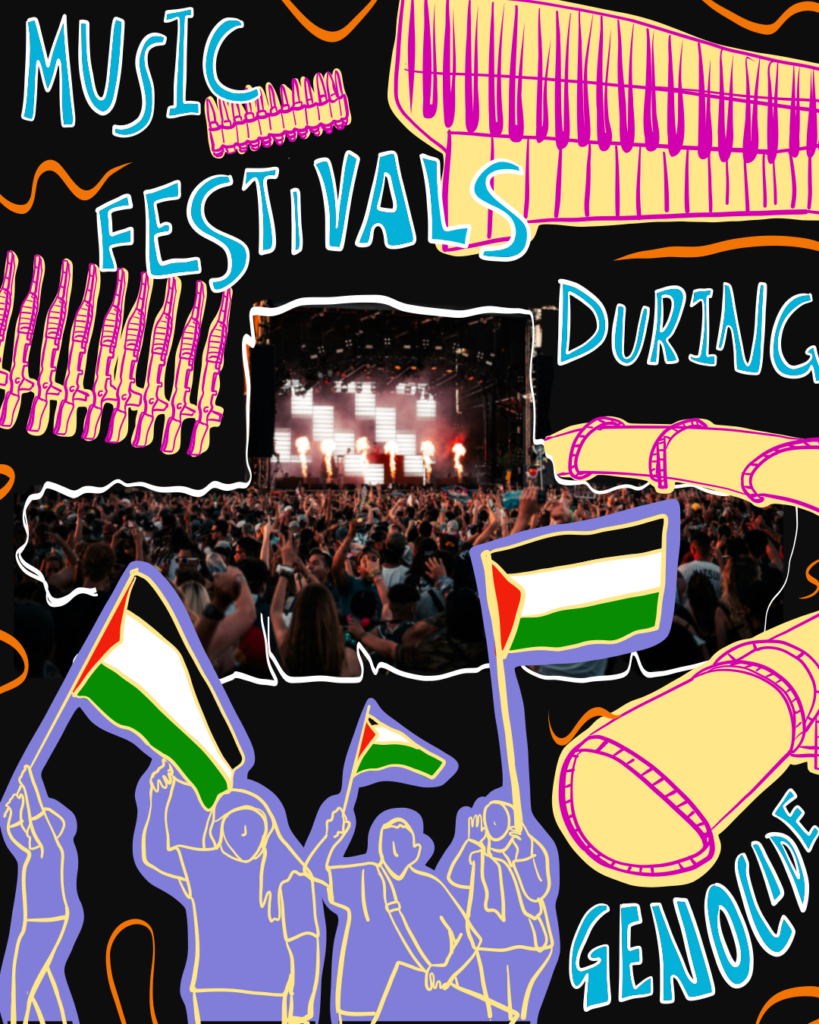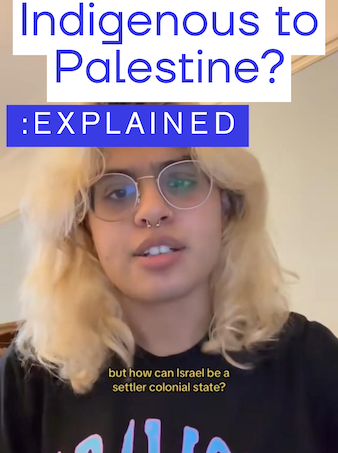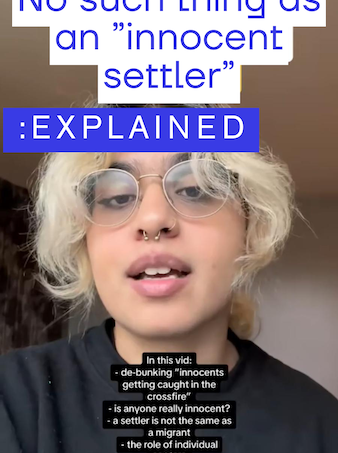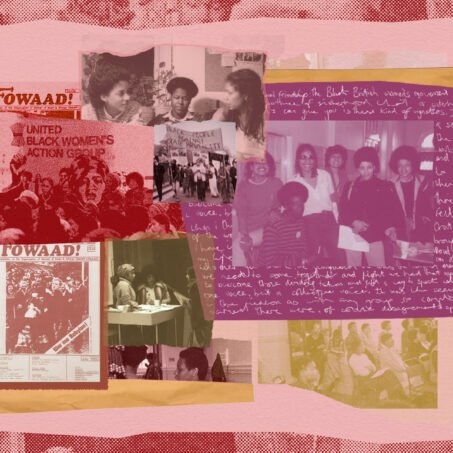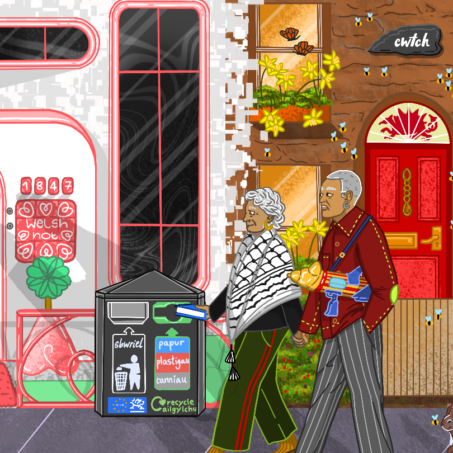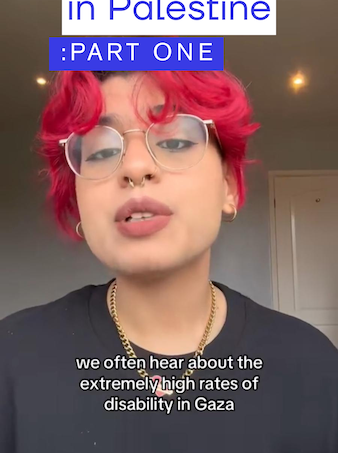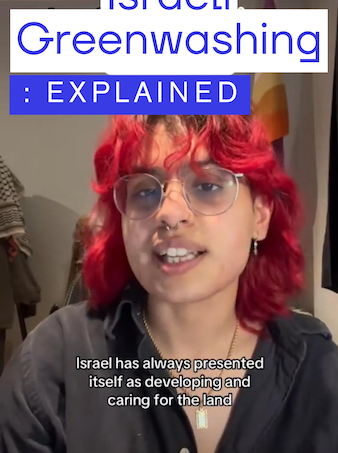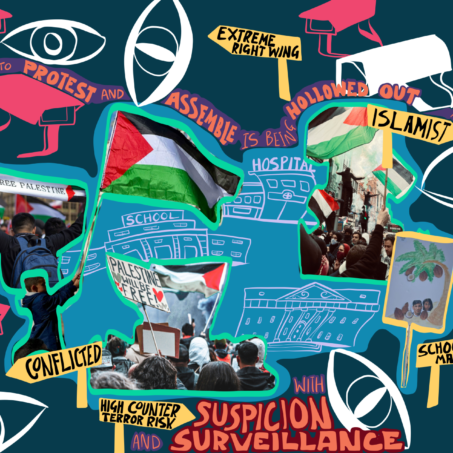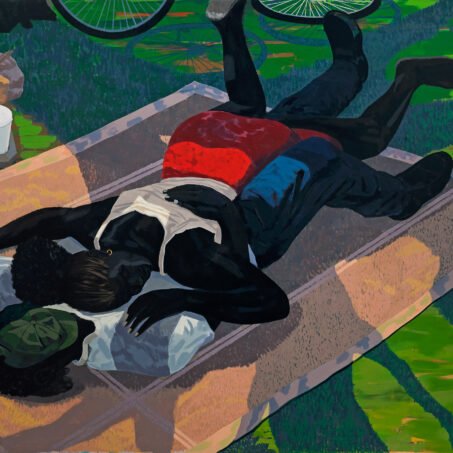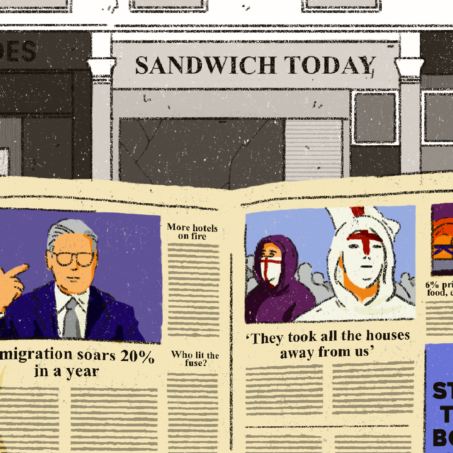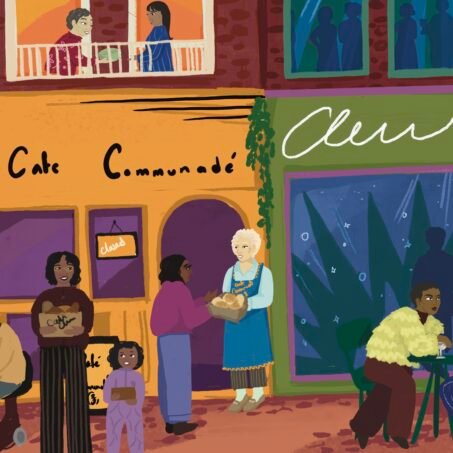London summer draws near with its promise of sticky heat, whiffs of smokey barbecues, tipsy sojourns in heaving parks and late nights of pulsating music. We await this with excited anticipation, looking forward to longer days, a garden party or two, a swim in the lido.
The summer season also brings with it the long-awaited (and for some, the dreaded) Outdoor Music Festival. The Outdoor Music Festival often markets itself as a “space to escape the outside world, a space to feel safe.” They say music brings us all together, that it “has the power to connect across borders, backgrounds and beliefs.” To this, I ask myself: to what end does it connect us and bring us together?
Yes, London summer draws near, and yet as we continue to bear witness to the unyielding horrors of the Zionist genocide in Gaza, we must resist the urge to escape, for there is much for us to do.
As I write this, I hear news of the martyrdom of nine of Dr. Alaa al-Najjar’s ten children, followed soon after by her husband’s death. The Zionist entity’s newest ground offensive, Operation Gideon’s Chariots, follows two months of total blockade on aid and food into Gaza. Palestinians in Gaza face mass starvation and continue to be massacred as they gather in aid centres. Meanwhile, the British government persistently lies about its role in facilitating this genocide, as it continues to export arms and F-35s to the Zionist entity despite the supposed suspension of arms licenses.
So within this bleak picture, where do we situate London’s festivals?
Park festivalisation and the underground’s co-option
Each summer, large portions of the city’s parks are cordoned off for an assured (and expensive) Good Time and a weekend of Reckless Abandon, much to the chagrin of local community members who complain of unbearable noise and an ever-shrinking public realm. Growing resistance to the commercialisation of public parks have put these festivals’ future in jeopardy, sparking fierce debate between proponents of so-called NIMBYism (Not In My Back Yard) and devoted festival goers, who insist on their Right to Party, their Right to Escape. In other words, festivals become spaces where Ostriches May Bury Their Heads.
Here, queer and/or underground culture is bastardised and capitalised off of, but prevented from being subversive. Festival performers find themselves in an awkward position: even if they disapprove of the festivals’ encroachment on public space, how can they maintain a principled stance against neoliberal privatisation and for community-led action without missing out on potentially career-defining gigs?
Under these conditions, can artists ever break free from the unrelenting pull of an increasingly corporatised arts industry? Can they still insist upon themselves as political agents or leaders of a collective? Can the underground, in all its fury and revolutionary potential, ever be recovered?
KKR’s material complicities
Campaigns against the neoliberal privatisation of parks are not the only obstacles for these festivals. As artists-turned-campaigners across the country and beyond have discovered, the “safe space” they are paid to cultivate and promote may well be owned by a private equity firm with investments in arms manufacturing, in gas pipelines destroying Indigenous land, or in Israeli companies perpetuating the Zionist settler-colonial occupation of Palestine. And so, for a growing number of these performers, this complicity is not something to turn away from and ignore, but rather something to build a now-global campaign around.
To get a better sense of all this, I spoke to three campaigners involved in the boycott campaign against Brockwell Park’s Field Day. All three are part of Sisu, a DJ collective that had been booked to perform at Field Day, a popular electronic music festival that explicitly prides itself for platforming underground music.
Field Day – like another 80 festivals across the world, as well as music broadcaster Boiler Room – is owned by Superstruct, which in 2024 was acquired by the notorious private equity firm KKR. KKR is invested in an Israeli data centre in Petah Tikva, an early Zionist settlement near occupied Yaffa. It has directly funded the IOF through donations to non-profit “Friends of the IDF.” It is also invested in the Coastal GasLink Pipeline, a project that has been met with fierce resistance by the First Nations Wet’suwet’en community in Turtle Island.
The Field Day campaigners explained to me that, in the wake of the Boiler Room media whirlwind, their first task was to untangle the “layers of power” and the “chain of complicity” in order to identify the most strategic target for their nascent campaign. They asked themselves: where did the power actually lie? Would it even be possible for Field Day itself to divest? And how would the answers to these questions inform where and how to direct the campaign’s energy?
Building a grassroots campaign
As they started to do their research, the campaigners found KKR to be “a ghost.” As they explain, “KKR is this anonymous entity that we’d never heard of before. It’s a conglomerate kind of private equity firm that is so massive that your average person won’t have any idea about who they are, or what they’re doing.” So, they drew on the expertise of the wider movement, as well as that of Palestinian Campaign for the Academic and Cultural Boycott of Israel (PACBI), in order to identify Superstruct/KKR as the ultimate targets of their divestment campaign; Field Day ultimately had no say in the investments of its parent companies. That said, although KKR was purposefully indecipherable, what the campaigners did have was leverage vis-à-vis Field Day.
After all, Field Day was benefiting financially off of the performers’ labour! By going through Field Day, the campaigners would be able to expose Superstruct/KKR and cause them reputational damage. In thinking all of this through, they told me they were inspired by the efforts of the Finnish Flow Strike campaigners.
Consequently, the campaigners decided that it was best to initially approach Field Day’s organisers in good faith to see how they’d respond, rather than go straight into antagonising them publicly.
They explained to me that, although it caused them discomfort to do so, their decision was led by a movement-building ethos. “It was important for us to build relationships and alliances where there is power and influence,” they explain. By doing their due diligence, they’d also avoid vilification and accusations of impulsivity. And yet, despite this, Field Day failed to respond.
In turn, the campaigners escalated: they penned an open letter to “build visibility, solidarity and pressure”, which gained the signature of over 200 artists, including some big names such as Brian Eno and Massive Attack. In response, Field Day agreed to a meeting, only to cancel right before it was meant to take place, refusing to comment on the open letter.
When is it the right time to boycott?
This is when it finally made strategic sense to call for a widespread boycott of the festival. Sisu performers withdrew from Field Day and called upon the festival’s other performers to do the same and hold the picket line with them. And many did, with over 20 acts pulling out.
Explaining the reasoning behind this deliberately measured approach towards staged escalation, one campaigner told me, “We’ve always very consciously been trying to build momentum and build a movement that will have some sort of longevity,” they explain. “This would allow us to look to other avenues of organising and mobilising.” To them, the campaign had to go beyond just “that one act of boycotting.”
Indeed, an individual artist’s boycott before the publication of the open letter would not have had, as they say, “the same weight as what has now become a coordinated and collaborative or collective boycott.”

Join our mailing list
Sign up for shado's picks of the week! Dropping in your inbox every Friday, we share news from inside shado + out, plus job listings, event recommendations and actions ✊
Sign up for shado's picks of the week! Dropping in your inbox every Friday, we share news from inside shado + out, plus job listings, event recommendations and actions ✊
In response to the snowballing boycott, Field Day finally released a vacuous statement that the campaigners interpret as a “panic” move, an “own goal” that signals the success of their campaign’s strategy – Field Day’s organisers had said they would not comment on the open letter and yet, here they were doing just that. “They thought that they could dispose of the unknowns, the small fish,” they say. “And what it actually showed was the power of community and the power of movement and they underestimated that massively.”
The campaign does not end here
Our conversation allowed these three campaigners to finally take a step back and take stock of what they had achieved so far. I pressed them on the intrinsic limitations of cultural boycott campaigns; some believe that since these campaigns fail to intercept the material flow of weapons to the Zionist entity, they are not worth the effort.
In response, the campaigners told me that they had decided to embrace this inherent tension. The movement must be made up of a diversity of tactics, they argued, and these tactics have to be deployed strategically. As nightlife performers and artists, they are well-placed to make vital interventions in a cultural scene that has been co-opted by corporate interests.
Although Field Day did end up going ahead, the campaign did not end there. In fact, it was always intended to be future-oriented. “The movement is the vehicle,” the campaigners explain. “We must listen to it, try to build it, nourish it, protect it at all costs – and then channel it.”
They insisted to me that the campaign had been (and continues to be) a “huge collective effort” in which a large number of people pulled on their connections and networks to build up as much pressure as possible. They excitedly outlined the campaign’s next steps, telling me about alternative events and fundraisers they were putting on in their effort to reclaim the underground’s alignment with progressive and liberatory forces.
Most notably, there will be a town hall that goes beyond music and brings together collectives and organisers to “skillshare, resource-share, meet each-other, and hopefully build a more unified network of people organising for Palestine in nightlife.” Through these events, they wish to pay tribute to – and hopefully revive – the radical history of the underground scene, which was pioneered by Black and brown people who were intimately connected to concurrent liberation struggles. Since then, the campaigners have also announced a strike fund to support performers who had boycotted the festival.
Ultimately, the campaigners behind the Field Day boycott have come to understand themselves as workers whose bodies and creativity are necessary for the functioning of any festival that capitalises off of their labour. And this London summer, these workers are organising themselves.
Of course, it is difficult to give up on potentially formative professional opportunities. Yet, as one campaigner put it, there are much graver things at risk. She imagined herself as an 80-year-old woman, looking back at her life, at 2025 when a genocide in Palestine raged on. She told the group, “I want to look back at [my life] and know that I made the right choice.” To that, we all nodded in agreement.
I leave our conversation feeling energised by the campaigners’ moral clarity. I am impressed by their commitment and resolve to keep the campaign growing, and to join forces with the scores of other organisers across the world who also seek to build proactively rather than reactively. Other Superstruct/KKR-owned festivals across the country and beyond are now the targets of similar boycott campaigns. Thinking ahead, and factoring in the experience the campaigners have now gained, I wonder what the movement will be able to achieve in time for next summer’s slew of festivals. I concede: music may well bring us together – together for a righteous cause, against genocide and settler-colonial occupation, and for collective liberation.
What can you do?
Follow:
Read:
- WAWOG’s statement on the Organic Boycott of Boiler Room and KKR
- Smith, Osborn and Vodicka’s book chapter on the festivalisation of London’s parks
- Nathaniel Steele’s piece on the power of boycott campaign
- What is Settler Colonialism?
